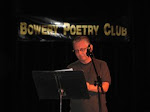Just shy of the two-minute mark, the percussion and some sort of barely perceptible keyboard kick in. The drums -- which are nearly isolated in the mid-to-left-hand channel -- sound like a Moroccan Jaki Liebezeit is taking them out for a test drive. I have never, never-ever, heard a kit being played like this on a Moroccan recording. (If we're lucky, Tim might let us know whether they strike his more acutely trained ears as unusual.) The guitar lopes along, breaking out into occasional fuzz-toned fills.
The second track is where things start to get mind-melty. I don't know the specific instrument that opens the track, but it's some form of keyboard or synthesizer, and very trippy. The strings and Jaki Liebezeit kit kick in, followed by a sudden trill of mechanized ululation that swooshes across the sonic landscape. The kid and an adult male chorus trade phrases.
This is not psychedelic in the normative sense. The architecture feels rooted squarely in Moroccan chaabi; it's in the fills and trills where things get freaky.
And it's on Side 2 that the psychedelia gets turned up, especially the second and final track. I'm not going to attempt to describe it, other than to note that the synthesizer and guitar do things in this 11+ minute scorcher -- and we're still *technically* talking fills -- that make my head spin.
And perhaps, dear reader, your head as well?


























%20-18%2047.jpg)
.jpg)



































































.jpg)


































